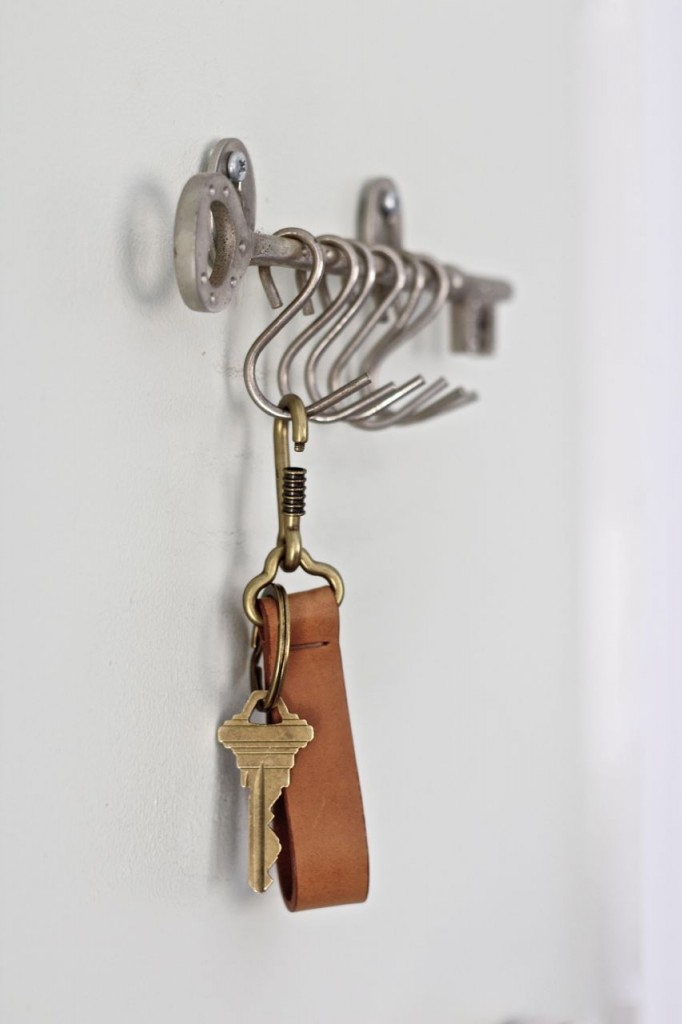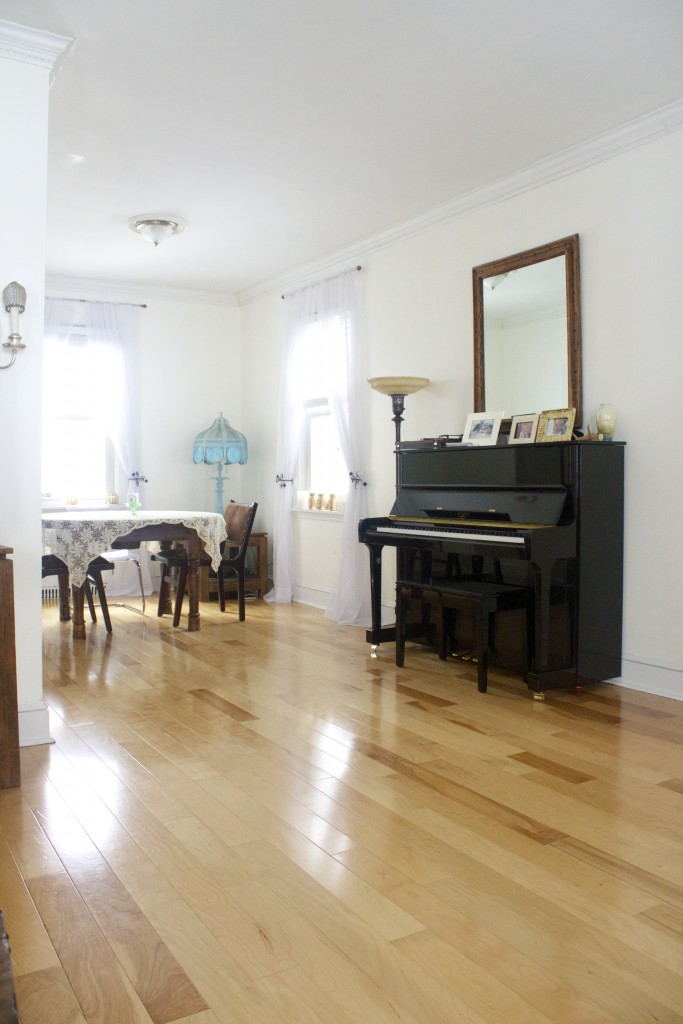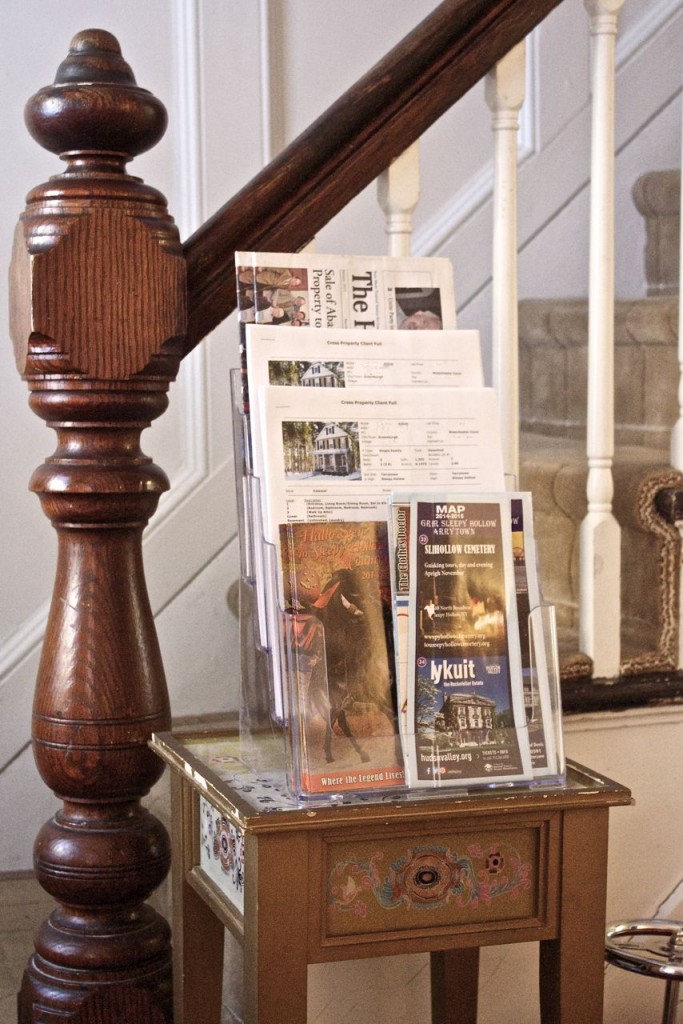
So…we sold our house.
So quickly it made my head spin.
It even made me panic a little. No, wait…are we sure?
(We’re sure.)
The house went so quickly mostly because the market right now is really strong, so it’s a fantastic time to be selling…but also because I think we kind of did a good job with it.
Look, I was dreading the idea of dealing with this process. Partially because I’m so emotional about our house and I knew it would be hard handing it over to someone else, but mostly because the idea of keeping my place in show-able (read: perfect) shape with two children and two dogs for months on end (forget about the logistics of getting those children and dogs out the door every time someone wanted to take a peek) sounded…miserable.
And so I decided, hell, let’s get an A+ on this paper, and applied each and every one of my ordinarily-irritating-but-in-this-case-quite-helpful Type A tendencies to the task of selling this house in five seconds flat.
And?
Sold.
In about five seconds flat.
(I was telling my friend Erin about my experience, and she said “You totally have to do a post on how to sell your house.” And I was like, eehhhh, I don’t know, shouldn’t someone with more experience be writing about this stuff? But the thing about house-selling (and house-buying) is that when you start the process it’s insanely overwhelming and intimidating, and then, once you’re out there on the other side, it feels a whole lot more manageable. Fun, even. And I think there’s value in hearing how the process works from someone who speaks, you know…English, as opposed to Real Estate Expert Language.)
1. Find A Broker To Sell Your House. This one was easy for us, because we love the woman who helped us buy this house so much that she’s become one of our dearest friends, so when it was time to sell, we just gave her a ring. But if you’re starting from scratch, you’re going to want to interview at least three brokers to find someone who feels like the right fit.
What I personally look for is someone who’s honest, direct, and decisive, but you may want someone who’s an especially aggressive negotiator, for example, or maybe someone with specific knowledge about your town, or your type of home. Choose wisely, because this person will be giving you a lot of very subjective advice and be doing a lot of speaking on your behalf.
2. Prep Your House As If The Scariest Mother-In-Law In The World (Or Maybe Martha Stewart) Is On Her Way Over. Think about who you would be most intimidated to have over for dinner (my mother-in-law is lovely and non-scary, but perhaps yours is terrifying). Prepare the house as if she’s coming over, and then prepare it more. Obviously this means cleaning everything within an inch of its life, but beyond that:
- Clear Out Your Closets. You want potential buyers to be able to actually see the storage space that’s available to them, so try this trick: remove half of the objects from each closet, and pack them away. It makes a huge difference.
- De-Tchotchke-Fy. Go through each room, and take out 2/3 of the tchotchkes. I left a few decorative items for color and personality, but put the majority of our personal items and bits and bobs in storage.
- Remove The Messier Evidence Of Small Creatures In Residence. As much baby and pet stuff as you can manage should go in storage. I don’t mean cribs and such, obviously, but kind of messy-looking things like Jumperoos, piles of toys, and that much-loved but very ugly dog bed sitting in the corner should be tucked away whenever possible. (And yeah, it was annoying having to drag this stuff up every time I needed to use it, but it kept things looking much more spare, and I think doing this makes it easier for people who don’t have pets and babies to envision themselves living in the house).
- Leave Only The Furniture That Adds Appeal. Some people say that it’s best to show a house completely empty, but that’s just not realistic if you haven’t purchased or rented another place yet. And I actually think that it’s nice to give people an understanding of how to use the space, but you certainly don’t want your furniture decreasing the space’s appeal, so now is the time to toss or store outdated, rickety, or otherwise unpretty pieces; keep only those items that make the space feel chic and light.
- Upgrade Where Necessary. I don’t personally believe in spending a lot of money on upgrades before listing your house for sale, because what appeals to some buyers won’t appeal to others, but if your walls are looking dingy or your floors are extremely scuffed, a little TLC can do wonders. Make sure your appliances (and your water, boiler, and gas) are in good working order. Repair any obvious cracks in the walls. Fix that loose step. In short: care for your property and bring its maintenance up to date, and don’t give people easy reasons to say “no.”
- Consider Staging. If you’re moving out prior to the sale and the house will be empty, you may want to leave a few select items to “stage” the house (in other words, make it look cozy and pretty and live-in-able). I once made an offer on a house that I might not have otherwise been especially interested in just because the owners had staged it in such a lovely, elegant way that it helped me see the space’s potential. You can hire companies to stage your home, but this is pretty pricey – depending on the level of furnishings and how long they stay there, it can be upwards of $10k – so it’s probably only worth it if you expect the property to bring a very high price.
3. Photograph Your Home Like A Little Ansel Adams, Minus The Waterfalls. Your broker will probably foot the bill for a photographer, but I decided to photograph my house myself because I love this place so much that I felt like I knew how to show off its best assets. I ended up actually having a lot of fun doing this (and discovered that I love how our home looks when we have less stuff in it; noted for the future).
How to photograph your house tips coming up shortly!
4. Show Your House. Once the broker has listed your house online, requests to view it will start coming in. This first week is crucial, because that’s when all the excitement of a new listing is at it’s peak, and people feel like they’re getting first crack at a potentially great deal (and of course the reality is that they are). So here’s what I think you do:
- Price you house to sell (that is, slightly below what you think it’s worth). That way you’ll get more people who want to look at the house, more people who feel it’s a good value, and ultimately more people who bid.
- Say yes to all requests to view, no matter how inconvenient, during those first few (yes, overwhelming) days. It’s worth your while to put in the extra effort right in the beginning, because the sooner you can stop showing, the happier you will be.
(Head down to the bottom of this post for more home-showing tips.)
5. Handle Negotiations With Respect. We received bids within 48 hours of putting our house on the market, but elected to wait to choose a winner until after our open house. I felt that this was a good compromise that let all interested parties view the house during the first few days, but didn’t keep those who expressed an early interest hanging for too long. After the open house, we let everyone who was interested know that they had 24 hours to put in their highest and best offer, and we would have a decision made 24 hours after that.
Why no bidding war? Because I remember what it felt like to be in one (or, ok…several) back in the day. It was excruciating, and generated all kinds of bad energy, and my feeling is that someone who really wants the house will come in with a price that suits you – and to me, there is enormous value in having the transaction proceed in a quick, professional, positive way. But of course some people are all for bidding wars, so consult your broker on this one.
6. Choose The Winner…And Choose A Backup. Once you have all your offers on the table, make your choice, let them know, and then let your second choice know that they’re in the running should the first sale fall through. Again, this is a way to keep everyone feeling informed and to curry goodwill on all sides without elevating expectations too much.
7. Appraisals And Inspections And All That Stressful Stuff. Sales fall through all the time, so don’t be heartbroken if yours doesn’t go as you planned. Here are some of the reasons a sale could fall apart:
- The house doesn’t appraise. If your buyer is taking out a mortgage, the bank has to inspect the house to make sure it’s “worth” the value that the loan places on it. If you’re selling in a hot market, your house may be worth more to a buyer than it’s worth to the bank based on its assets. A cash offer makes this more unlikely, because the bank simply isn’t involved.
- The mortgage falls through. Personal circumstances on the part of your buyer could create any number of issues (a job loss, the discovery of additional liabilities, et cetera). If you have a cash offer, again, this isn’t an issue.
- Inspections don’t go as planned. During our initial home search, we discovered that a house we had an acceptable offer on had an underground oil tank, and pulled out because we were afraid of the potential liability. Your buyer’s inspector may uncover things that you have to fix (in order for the bank to approve the loan), or things that they would like you to fix – and the latter is up to you. If you don’t want to make the fixes that the buyer requests you’re welcome to offer the house to your backup, but remember that they may want the same – or additional – fixes.
8. The Big Close. The last step in the process is the closing, where lots of checks get written. The buyer (or the buyer’s bank) will write you checks, and you, in turn, will write checks to your bank (to pay off the remainder of your mortgage), your broker (usually about 6% of the total sale price, split between the listing agent and the buyer’s agent), your lawyer, and various other entities.
The additional closing costs will vary by state, but they can include things like transfer taxes, prorated property taxes, and other things that are very terrifying-sounding but probably don’t amount to all that much. All told, you’ll probably pay out 10% of your home’s sale price before you can run off and celebrate (or start writing checks for your next house).
This is tricky. Unless you have assets that vastly outweigh your liabilities, it’s no easy feat to buy your second house prior to unloading your first, because that would essentially mean that you have to be approved for the value of the second mortgage on top of the value of the first. Talk to a mortgage broker, and they’ll do an analysis of your assets and liabilities to see if it’s possible to give you a loan on a second house prior to closing on the first – it might be, as rules regarding whether you can be approved for a mortgage prior to closing on the house that you’re selling vary by state. Also, remember that the likelihood that a seller will consider an offer from a buyer who’s ability to purchase is contingent on the sale of their first home is largely dependent on the strength of a given housing market (in other words, if they have lots of offers they’re not going to take yours if yours is contingent on the sale of another property).
If you can’t secure a mortgage on your second house prior to closing on your first, these are your two best options:
- See if your buyer would be willing to close early and rent back the property to you until an agreed-upon move-out date. You will likely need to purchase renter’s insurance and have your attorneys work out the details so that there’s no fear than anyone will renege on the contract.
- Consider living in temporary housing while you house-hunt for your new home. (This is likely what we’re doing; I’m scouting storage options and pre-furnished apartments for us to live in this summer so our house hunt isn’t as rushed as I’m worried it might be otherwise.)
All of these ideas are totally persnickety and certainly aren’t requirements…but you know what? In a hot market, every little bit helps. So why not bring your A Game?
- Provide Extra Info. Set out a little table close to the door with information on the house, as well as pamphlets about the town, special attractions, et cetera.
- Add Fresh Scent. Nothing floral, nothing spicy, nothing foodie: just a light, airy scent in each of the rooms (I went with cucumber and arugula diffusers) can make a big difference in your potential buyers’ experience of your home.
- Show Your Magic Eraser Some Love. Do you know what a Magic Eraser is? No? It’s magic. Go buy one, and divest your walls of all those attractive scuff marks.
- Get It As Light As Possible In There. Turn on every single light. Open every single curtain, and pull up every single blind. If there’s a view you’d rather not call attention to, leave the blinds at half-mast but open, to let light in.
- Play Pretty, Inoffensive Music. I turned on a classical radio station very low while people were looking at the house because I felt like it made the house feel lived-in and warm.
- Light A Candle. Obviously don’t leave candles burning unattended, but if you’re leaving the house right before the showing and coming back right after I think an unscented (or very subtly scented) candle adds a little warmth and life. If you have a fireplace, oh please light it. I think I would probably buy any house with a crackling fireplace in it.

Photo: Ariane Moshayedi
Fact: Kids and animals make this whole deal immeasurably more difficult, because the reality is you have to get them out for each and every showing (you’ll just do better that way, I promise). But it’s not easy, which is why if you have small creatures in residence you have to up your game on all the other fronts to get that place sold quickly.
- If you can, get someone to watch your dogs during that first week or two, when you’ll have lots of showings (and definitely during the open house). If it’s warm out, you can take them to a park when people are viewing your house, but if it’s cold you’re stuck driving around in circles in your car, eating Burger King and staring at the clock (ahem).
- Keeping the house clean with kids and dogs is a pain: I basically tried to keep the time we spent at home to the bare minimum so I didn’t have to worry about cleaning up toys and food every three seconds and could just address each mess as it arose. I personally found it easier to be constantly vigilant for a short time period than to let things slide and do massive clean-ups whenever we got a call that a showing had been scheduled.
- No cooking. The week (or weeks) when you’re showing your house is a really, really good time to eat out as much as possible, because cooking a) generates mess that you will have to clean immediately should someone want to see your place and b) has the potential to smell weird.
So…there you go. That’s how we did it.
And now our era of life in our Alice In Wonderland house is coming to a close. It’s not an easy thing to say good-bye to, but it’s also so exciting to be taking that next (very big) step.
Related: How To Buy Your Very First Home







